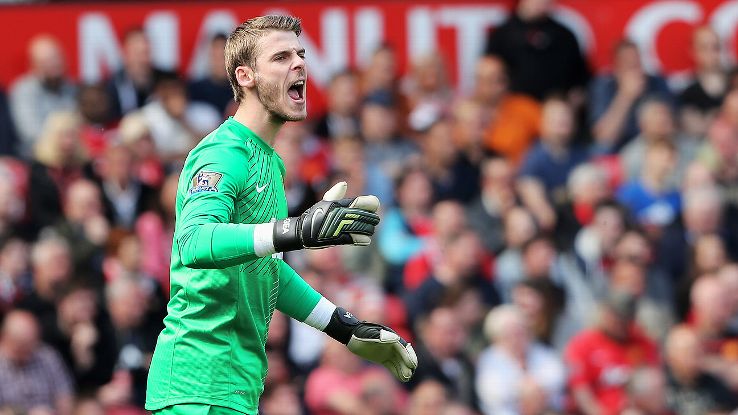Of course, there are the obvious highlights, such as the 1-1 draw away to Real Madrid in the UEFA Champions League in the 2012-13 season, when De Gea displayed the type of reflexes of a man who could catch a flea with chopsticks. The save he made from Fabio Coentrao after only a few minutes, when his outstretched glove somehow turned a drive against the post, had none other than Peter Schmeichel almost gasping in disbelief during his half-time analysis. But then there are the less obvious moments in which he can take equal if not greater pride: the manner in which he came to command his penalty area week by week, the assurance with which he came to claim a high ball.
Funnily enough, this past weekend showed perfectly the progress that De Gea has made. There was a time when his mistake for West Ham's goal, a failure to deal with a corner, would have been seen as characteristic; now, though, it is merely regarded as an aberration. It is interesting to contrast De Gea's fortunes with those of Joe Hart, his counterpart at Manchester City, who is continuing to endure one of the most difficult periods of his career. While De Gea is now the undisputed No. 1 at Old Trafford, if not one day for Spain's national team, Hart's primacy at the Premier League champions is now under threat.
Among footballers, goalkeepers have a tough lot, perhaps the toughest. Strikers can create their own chances, and thus write their own scripts, but goalkeepers must wait for the chance to prove themselves hero or villain. For several months of De Gea's first season at Old Trafford, and even for some of his second, it seemed as though his story might have an unhappy ending, particularly given the consistent problems that Sir Alex Ferguson had faced in replacing Schmeichel. For all Ferguson's greatness as a manager, he seemed at times to have two curious blind spots in his teams, in central midfield and in goal. Not till Edwin van der Sar, a player he regretted not moving for sooner, did he find a worthy heir to the Dane. And with the arrival of De Gea for an eyebrow-raising fee not far short of 20 million pounds, he solved his goalkeeping problem for the long term.

De Gea, in both his posture and playing style, resembles Van der Sar far more than Schmeichel; whereas Schmeichel was a pillar of bellowing, bustling muscle, Van der Sar was a man so tall and slim that he seemed almost apologetic, like a local postman who has just knocked on the wrong door. Yet like Van der Sar, De Gea is someone whose apparently slight frame disguises a terrific resilience, a businesslike authority. Louis van Gaal would perhaps also have welcomed the chance to work with De Gea, given that the Spaniard plays as if he were a graduate of the Dutch school of goalkeeping, seen in its most modern form in Stanley Menzo at Ajax, who was then succeeded by none other than Van der Sar. De Gea's footballing ability -- his stock-in-trade skill to evade advancing strikers is the Cruyff turn -- places him within that "sweeper-keeper" tradition, as someone capable of building attacks from the very back.
Like Thibaut Courtois, his main competitor for the title of the world's best young goalkeeper, De Gea began his career under uncommon scrutiny. While Courtois can probably claim to be ahead in those stakes -- having returned from a good World Cup, following an exceptional season with Atletico Madrid -- De Gea is not far behind, having claimed a Premier League medal in 2012-13 behind a defence that was far less than formidable, and then emerging as one of the only bright spots in that mostly brutal season under David Moyes.
The turning point for De Gea, in the eyes of both the media and his own manager, can probably be identified as a Premier League game against West Ham United in April 2013. Here, with Ferguson still in charge and driving his team towards a 20th league championship, De Gea was faced with what the irate Scotsman described as "an assault" from Andy Carroll and, impressively, more than held his own. This was the result in no small part of the excellent tutelage from the then-goalkeeping coach Eric Steele, who gave De Gea a health and fitness regimen that gave him far greater brawn and conditioning. Crucially, of course, the work ethic came from De Gea himself, who continued that diligence under Chris Woods and will now do so under Frans Hoek. Hoek's teaching, having been honed at Ajax, Bayern Munich and Barcelona, will be a fine finishing school for the Spaniard.
All of this bodes well for the next few years of De Gea's career, which at the age of only 23 sees him as a firm fixture for one of the biggest clubs in world football. He has often been identified as the heir to Iker Casillas in Spain's goal, and he is proving that he has the talent for his legacy, one day, to be mentioned in the very same breath.
No comments:
Post a Comment